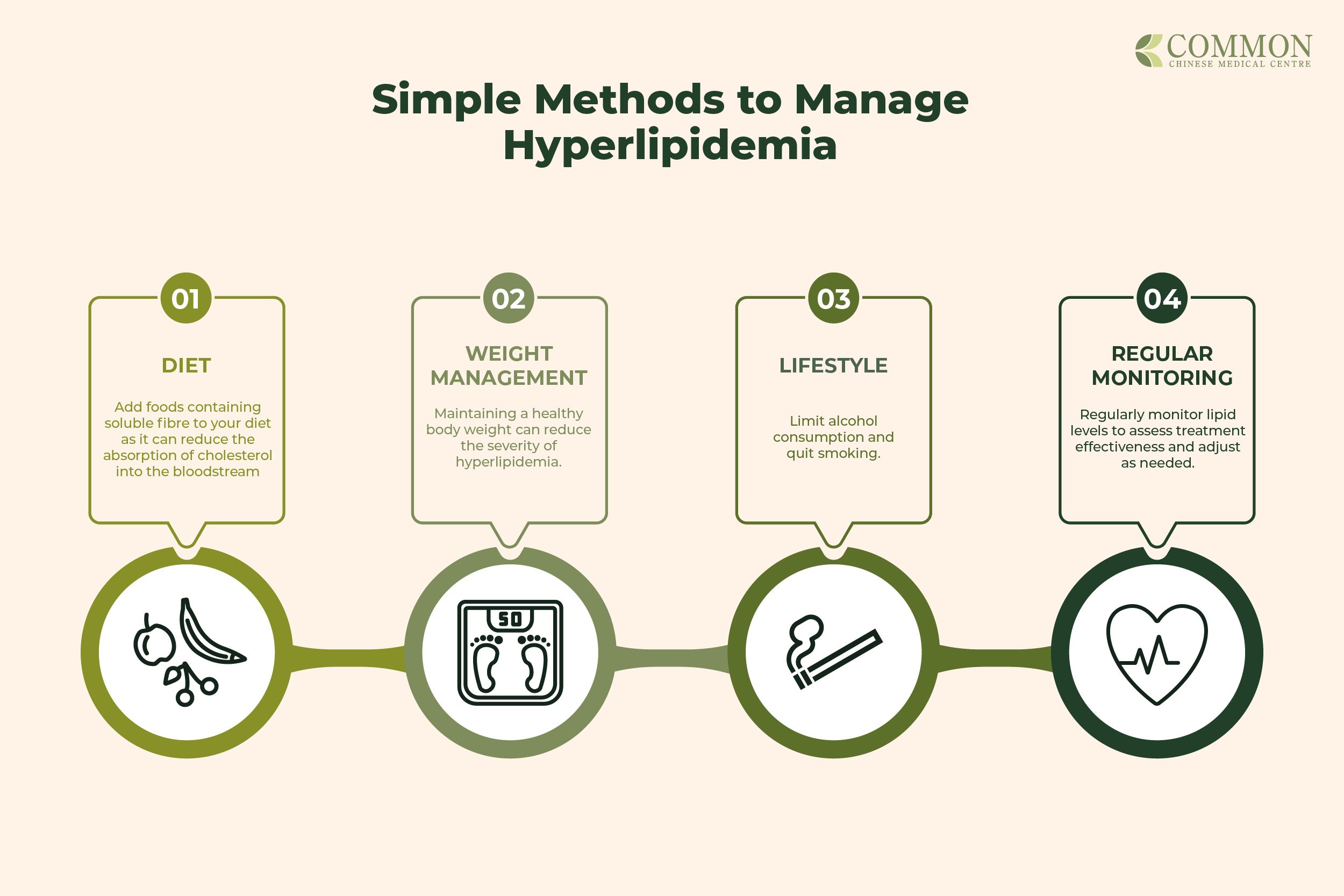How do we manage Hyperlipidemia with TCM Treatment?
Note: All words in Italics refer to TCM terminology and not the definitions referenced in western medicine and mainstream understanding.
What is hyperlipidemia and how does it affect me?
Hyperlipidemia, commonly known colloquially, albeit inaccurately, as high cholesterol, is a prevalent metabolic condition that can lead to heart disease or stroke if left uncontrolled. It occurs when lipids, such as total cholesterol (TC), triglycerides (TG) and low-density lipoprotein (LDL) increase in the blood. This can lead to the narrowing of blood vessels and an increased risk of serious health problems, including heart disease and stroke. Alongside hypertension (high blood pressure) and diabetes (high blood glucose), hyperlipidemia forms a trio of metabolic conditions that often affect people in their later years. Hyperlipidemia is primarily classified into two main types:
Hypercholesterolemia: Elevated levels of TC in the blood.
Hypertriglyceridemia: Elevated levels of TG in the blood.
Causes of hyperlipidemia
Genetics and family history: Genes and habits similar to someone with hyperlipidemia can predispose one to it.
Obesity: Being overweight increases the risk of developing hyperlipidemia.
Poor diet: A diet high in saturated and trans fats is a risk factor for developing hyperlipidemia.
Lack of physical exercise: Less active and less fit people have a greater risk of developing hyperlipidemia.
Excessive alcohol consumption: Alcohol is broken down into triglycerides and cholesterol in the liver. If your TG levels become too high, they can build up in the liver, causing fatty liver disease. The liver can’t work as well as it should and can’t remove cholesterol from your blood, so your TC levels rise[1].
Smoking: Smokers are found to have a higher serum concentration of TC compared to non-smokers thought to be caused by nicotine in cigarette smoke[2].
Certain medical conditions: Diabetes, hypothyroidism and kidney disease could lead to hyperlipidemia.
How is hyperlipidemia diagnosed?
A blood test, typically a lipid panel or lipid profile, is used to diagnose hyperlipidemia. This test measures various lipid components in the blood, including TC, LDL, high-density lipoprotein (HDL), and TG.
Self Help Tips for Managing Hyperlipidemia
Hyperlipidemia is a sign that lifestyle changes are necessary to manage and even reduce TC and/or TG to normal levels. Remember that early detection and lifestyle changes can significantly reduce the risk of heart disease and stroke. Some helpful lifestyle changes include:
Diet: Limit saturated and trans fats found in processed food. Choose grass-fed sources of red meat and dairy whenever possible. Add foods containing soluble fibre to your diet as it can reduce the absorption of cholesterol into the bloodstream[3].
Exercise and weight management: Aim for at least 150 minutes of moderate-intensity exercise per week. This can be broken down into 30 minutes, five days a week. You can mix and match aerobic exercises for cardiovascular health and anaerobic exercises like strength training to build muscle and improve metabolism. Maintaining a healthy body weight can reduce the severity of hyperlipidemia.
Lifestyle: Limit alcohol consumption and quit smoking.
Regular monitoring: Continual monitoring of lipid levels is essential to assess the effectiveness of treatment and make necessary adjustments.
Evidence-Based TCM Treatment Approaches for Managing Hyperlipidemia
Traditional Chinese Medicine (TCM) typically classifies hyperlipidemia as belonging to the “Phlegm-Dampness or Phlegm-Heat” category of TCM Diseases. Consequently, formulas or herbs that address this imbalance can be useful in the management of hyperlipidemia.
Herbal Medicine
Modern research has demonstrated that certain herbs can lower TC, TG and LDL through inhibition improving hepatic fatty acid oxidation and suppressing the TG and fatty acid synthesis in the liver[4]. One such herb is 山楂 (Crataegus pinnatifida). A formula known for its reputed blood pressure-lowering effects is 血府逐瘀汤 (Xue Fu Zhu Yu Decoction). According to medical studies, it can exhibit antihyperlipidemic, antioxidation, and anti-inflammatory activities through interfering with metabolic pathways to inhibit fat storage[5]. Taking into account the specific constitution of your body, a qualified TCM practitioner can create a personalised formula tailored to you.
Acupuncture
Acupuncture has been shown through clinical trials to aid in blood lipid maintenance. In a meta-analysis of acupuncture and related therapies for hyperlipidemia, it was discovered that all kinds of acupuncture-related therapies are more effective than lifestyle changes alone in management of hyperlipidemia. Studies indicate that it achieves this through an antioxidant effect on the walls of the arteries and the muscles of the heart[6]. Some commonly used acu points for hyperlipidemia management include 天枢 Tian Shu (ST25), 足三里 Zu San Li (ST36) and 阴陵泉 Yin Ling Quan (SP9).
How Many Sessions Do I Need at TCM Clinic?
At Common TCM, your physician will review your medical history and determine the optimal frequency of visits to our TCM clinic in Singapore based on your current metabolic health, lifestyle and any presenting symptoms. Although there is no single timeline for reversing hyperlipidemia, a personalised TCM treatment plan will review TC,TG and LDL for 3 months to identify the efficacy of treatment and lifestyle changes on these parameters. Should the treatment be effective, not only will you experience improved TC,TG and LDL levels, but your overall health condition will also improve.
Who is TCM Treatment for Hyperlipidemia suitable for?
Pregnant individuals or those planning for pregnancy should consult with their physician and inform the physician of a possible pregnancy, as certain acupuncture points and herbs are contraindicated during pregnancy.
Most importantly, do your research and seek advice from reputable professionals for an elevated healing experience. For more information, visit our website to learn more about our treatments and physicians or to book an appointment. Your well-being is our priority, and we are here to support you on your journey towards better health.
References:
[2]https://www.ncbi.nlm.nih.gov/pmc/articles/PMC1836079/
[4]https://www.sciencedirect.com/science/article/pii/S1756464622000585
[5]https://www.sciencedirect.com/science/article/pii/S0378874115001993
[6]https://www.sciencedirect.com/science/article/pii/S2589377720300665



